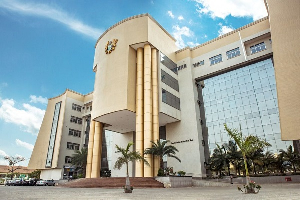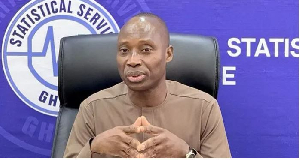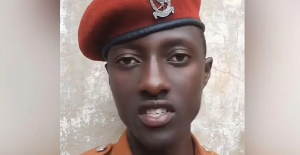BACKGROUND
The High Court, Accra, presided over by Justice Forson Agyapong Baah, on Saturday, 4th January, 2025, granted the mandamus application brought by the NPP to compel the Electoral Commission (EC) to complete the collation exercise and declare the winners of the parliamentary elections in Tema Central, Okaikwei Central, Techiman South, and Ablekuma North Constituencies in accordance with its constitutional and statutory mandate. Contrary to what was put out by some media houses, the NPP’s mandamus application has nothing to do with a demand for re-collation of any parliamentary results.
The Party was only asking the court to direct the EC to complete the collation of all the polling station results in the affected constituencies as required by law before declaring the respective winners of the parliamentary elections. The second relief sought by the NPP was an order from the court to compel the IGP, [who had earlier declined to provide security to the EC for the completion of the collation], to provide adequate and armed security to the EC to collate the results from all the outstanding polling stations in the affected constituencies and declare the respective winners as required by law.
This write-up seeks to analyze and simplify the judgment of the court as read by the Presiding Judge on Saturday and to bring to the fore some of the relevant aspects of the court proceedings including evidence adduced by the respective parties and the authorities they relied on.
STATEMENT OF THE LAW
The position of the law is that the EC is the only institution with the constitutional and statutory authority to conduct and supervise all public elections in Ghana [See Article 45(c) of the Constitution]. The Constitution also provides that in the exercise of its functions, the EC shall be independent and not subject to the direction or control of any person or authority [See Article 46]. It is trite that in a public election, declaration of election results is based on the figures collated for the various candidate, hence collation must always precede declaration. You cannot just declare election results if you have not done collation.
WHAT CONSTITUTES COLLATION IN LAW?
According to the Public Elections Regulations, 2020 (C.1 127), collation must be based on ALL the Polling Stations in the Constituency, which is to be done by the Retuning Officer [See Regulation 43 of C.I 127]. Therefore, no declaration of a winner can be done without prior collation and summation of the results from all the polling stations and the filling of the Constituency Election Results Collation Forms (Form 1C), otherwise known as the Constituency Collation Sheet, which has been defined in Regulation 50 of C.I 127 to mean:
“the sheet that contains the parliamentary results of ALL polling stations within the constituency”
It is thus the position of the law that declaration must be based on collation of all polling station results, not some. The EC or its officers particularly Constituency Returning Officers have no authority to exclude even a single vote cast by a voter in the exercise of his constitutional right to vote under Article 42 of the 1992 Constitution. Any such act undermines the sovereign will of the voter, because the ultimate purpose of election in a democracy is to give effect to the sovereign will of the people as expressed by them at the polls. [See In Re Presidential Election Petition; Akufo Addo & Others v Mahama & Others. i.e. the 2012 Election Petition].
JURISDICTION OF THE HIGH COURT TO ISSUE AN ORDER OF MANDAMUS
The Constitution, under Article 23, enjoins administrative bodies such as the EC to act fairly and to comply with the requirements imposed on them by law. The same Article 23 gives persons aggrieved by the decisions of administrative bodies the right to seek redress before a court.
Mandamus is the public law remedy available to any party that is aggrieved by the decision (actions or inactions) of public bodies in the exercise of their constitutional or statutory duties to compel them to act fairly and to comply with the requirements imposed on them by law.
The High Court is the only court with the authority to issue judicial review orders such as a mandamus under its supervisory jurisdiction over all lower courts and any lower adjudicating authority such as the EC for the purpose of enforcing or securing the enforcement of its supervisory powers [See Articles 141 and 161 of the constitution].
The authority of the High Court to issue directives and orders such as mandamus under its supervisory jurisdiction is also derived from Section 16 of the Courts Act (Act 459) and Order 55 of the High Court Civil Procedure Rules, 2004 (CI 47).
The Supreme Court has consistently held that before a court can grant or issue an order of mandamus, the following conditions must be met:
- There must be a duty imposed by statute
- The duty must be of a public nature
- There must be a demand by the Applicant on the public body to perform its public duty
- There must be a failure or refusal to perform that public duty
[See Republic v Chieftaincy Secretariat & Another; Ex Parte Adansi Traditional Council. Also see, Republic v EC and Mrs. Rebecca Adotey; Ex Parte George Amo; AND Republic v National House of Chiefs; Ex Parte Akrofa Krukoko].
It is also the position of the law that “a statutory duty should be performed without delay. Thus, if any such delay occurred, mandamus might be employed to enforce the performance of such duty” - Republic v Court of Appeal; Ex Parte Lands Commission – Vanderpuye Orgles Estate Ltd, Interested Parties.
So, where in the opinion of a presiding judge in a mandamus application, these conditions are satisfied, the judge can grant the application to compel the performance of that statutory duty. This is exactly what Justice Forson Agyapong Baah did when he dismissed the NDC’s preliminary legal objection on the matter of jurisdiction and proceeded to hear and grant the NPP’s mandamus application upon being satisfied that all the laid down requirements for the grant of mandamus had been met by the Applicants.
THE CASE OF THE NPP
It is the case of the NPP [the Applicants] that the EC has a duty imposed on it by statute to collate the results of ALL POLLING STATIONS in the affected constituencies and declare winners [This is a fact based on Regulation 43(1) of C.I 127]. That, this duty is a public duty [This is a fact based on Article 45 and Regulation 43(1) of C.I 127]. That, the Applicants have placed a demand on the EC to perform this public duty [This has been done.
The NPP exhibited in court all the demand letters written by the Applicants to the EC demanding the completion of the collation]. That, the EC has failed to perform that duty [This is evidenced by the fact that the duty had not been performed by the EC, thus, compelling the Applicant to file the mandamus application]. Ultimately, the NPP, as noted by the Presiding Judge in his judgment, had, based on the law and the evidence on record, satisfied all the requirements for the grant of mandamus as laid down by the apex court.
THE CASE OF THE ELECTORAL COMMISSION
It is the case of the Electoral Commission that it has not finished collating the results of the parliamentary elections for Tema Central, Okaikwei Central, Ablekuma North and Techiman South Constituencies when party thugs stormed the respective collation centres, forcibly took charge of the collation process and compelled EC officers to declare their candidates as winners. The EC prayed the court to make appropriate orders that will enable the commission to complete the collation and declaration of the results in these four constituencies.
THE CASE OF THE NDC
It is the case of the NDC that the NPP [Applicants] has not fully satisfied all the laid down requirements for the grant of mandamus. According to the NDC, so long as there has been a declaration, it doesn’t matter who does the declaration and it doesn’t also matter whether or not the declaration was based on the collation of the results from ALL polling stations. And that, once a declaration has been done, the only remedy available to an aggrieved party is to file an election petition and not to come to court with a mandamus application seeking to compel the performance of a duty that had already been performed.
The NDC supported their case with what they claimed was the position of the Electoral Commission chairperson on the matter during the 2020 parliamentary elections in Techiman South, when she told the then NDC Minority to go court with an election petition if they disagreed with the declaration made by its Returning Officer for Techiman South. However, the EC lawyer rose to his feet and drew a distinction between the development in 2020 and what was before the court.
According to him, the EC Returning Officer for Techiman South for the 2020 parliamentary elections had collated the results from ALL THE POLLING STATIONS in the constituency and filled all the relevant statutory forms. There was nothing left to be done by the EC. However, in the present suit before the court, the claim being made is that the EC had not finished collating the results from all the polling stations in the affected constituencies and had not, on account of that, filled the relevant statutory forms as required by law.
THE COURT PROCEEDINGS AND THE EVIDENCE ON RECORD
(1) TEMA CENTRAL
The parties presented exhibits in the form of pen drives containing pictures and videos to the court to prove their respective cases, which were played in open court. The NPP videos showed acts of disruptions of the collation exercise allegedly by NDC thugs led by one Malik Basintale, an NDC National Executive who was heard vowing to force the EC to declare their Candidate, Ebi Bright, as winner of the election whether or not her victory reflected on the pink sheets.
The video also showed the alleged NDC thugs singing and chanting revolutionary songs and turning the collation centre into a chaotic scene. The NDC video shows an individual declaring Ebi Bright of the NDC as winner based on undisclosed number of polling stations in the constituency. It later emerged in court that the said individual was not the Returning Officer for Tema Central. He was identified as John Nunoo, a staff of the EC at the Tema West Municipal. However, the EC Returning Officer for Tema Central is called Kwasi Brobbey.
The NDC that claimed their candidate had won the elections came to court with no evidence of that victory in the form of the required Parliamentary Elections Results Collation Form (Form 1C) and the Parliamentary Results Summary Sheet (Form 1D) as required by Regulation 43(1)(f) of C.I 127. Indeed, the video that was played in open court showed Mr. John Nunoo declaring the results from an A4 sheet.
Decision of the court on Tema Central
The court noted that the gentleman who did the purported declaration was not the Returning Officer for Tema Central and had no lawful authority based on the C.I 127 to collate and declare the parliamentary results for Tema Central. The court also found out that the purported declaration was based on incomplete collation as it was done without the inclusion of the results from two polling stations which could impact the eventual outcome.
Consequently, the court ordered the EC to go and collate the results from the 2 remaining polling stations on or before the 6th of January 2025, in order to complete the collation exercise as required by law before declaring a winner. The court further ordered the IGP to provide adequate and armed security for the collation exercise.
(2) OKAIKWEI CENTRAL
The video presented by the NDC as evidence of the declaration of their candidate, Baba Sadiq, which was played in open court, had no volume. The NDC lawyers did not comment on their own video. The NPP on the other hand, coincidentally presented the same video but their video had volume. The EC Returning Officer who was declaring the results under visible duress from the likes of Hon. Sam George and other NDC executives and party thugs, stated emphatically that he had only collated the results from 110 polling stations out of 140.
This meant that the results of 30 polling stations in Okaikwei Central had been excluded, together with the special voting centre adding up to 31 polling stations. The NDC that claimed their candidate had won came to court with no evidence of that victory in the form of the required Form 1C and Form 1D as required by Regulation 43(1)(f) of CI 127 to prove their case.
Decision of the court on Okaikwei Central
The court ordered the EC to collate the results of the remaining 31 polling stations on or before the 6th of January, 2025, in order to complete the collation of the results from ALL the polling stations in Okaikwei Central as required by C.I 127 before declaring a winner of the parliamentary elections. The court further ordered the IGP to provide adequate and armed security for the collation exercise.
(3) ABLEKUMA NORTH
Both parties presented videos to prove their respective cases. Whereas the NPP video shows alleged NDC thugs threatening to beat and kill the EC Returning Officer if he failed to declare their candidate, Ewurabena Aubynn, as winner of the parliamentary elections, the NDC video shows a purported act of declaration.
What came out clearly and was not denied by any of the parties is that the purported declaration of the results was based on only 219 out of 281 polling stations in Ablekuma North. The NDC that claimed their candidate had won came to court with no evidence of that victory in the form of the required Form 1C and Form 1D as required by Regulation 43(1)(f) of CI 127 to prove their case.
Decision of the court on Ablekuma North
The court ordered the EC to collate the results of the remaining 62 polling stations on or before the 6th of January 2025, in order to complete the collation of the results from ALL the polling stations in Ablekuma North Central as required by C.I 127 before declaring a winner of the parliamentary elections. The court further ordered the IGP to provide adequate and armed security for the collation exercise.
(4) TECHIMAN SOUTH
Both parties presented the same video evidence to the court showing a purported declaration of the parliamentary election results for Techiman South and acts of disruptions at the collation centre. The video showed no declaration at all as no figures were mentioned; even the names of the parliamentary candidates were not mentioned by the Returning Officer save to raise the hands of the NDC Parliamentary Candidate, Christopher Bayere and the mob shouted that he had been declared and began jubilating.
The NPP exhibited another video showing Sammy Gyamfi, the NDC National Communications Officer addressing the press and party supporters after the general elections. In the video, Sammy Gyamfi categorically stated that the NDC had won all the parliamentary seats in the Bono Region WITH THE EXCEPTION OF TECHIMAN SOUTH Constituency. So, what has changed? Why is the NDC now claiming that they won the Techiman South parliamentary seat?
In any case, despite claiming that they won Techiman South, the NDC came to court with no evidence of that victory in the form of the required Form 1C and Form 1D as required by Regulation 43(1)(f) of C.I 127 to prove their case. They however managed to present what looked like a Form 1C but the validity and authenticity of same was questioned by both the EC and the NPP. The EC lawyer informed the court that the commission had not issued any Form 1C in Techiman South because it had not finished the collation when thugs stormed the centre and disrupted the exercise.
The EC lawyer also identified some defects in the Form 1C presented by the NDC as a true copy of the Techiman South Parliamentary Results Collation Form. According to him, the serial number and the code do not tally with the unique serial number and code for the constituency, and that, even the name of the Municipality, which was given as Techiman South Municipal was wrong, because there was no district/municipality in Ghana known as Techiman South district/municipality. He then concluded that what the NDC presented to the court is a product of forgery intended to mislead the court.
Decision of the court on Techiman South
The judge did not make any findings of fact on the allegation of forgery, ostensibly because he was not conducting a criminal trial. However, on the issue of the collation, the judge noted based on the evidence on record that the collation was incomplete as it was based on the results collated from only 135 out of 282 polling stations. He therefore ordered the EC to collate the results from the remaining 147 polling stations as required by law. The court further ordered the IGP to provide adequate and armed security for the collation exercise.
CONCLUDING COMMENTS AND OBSERVATIONS
As noted, the NDC’s argument is that once a declaration has been done, it doesn’t matter whether it was preceded by a collation and doesn’t also matter how void and unconscionable the declaration is, an aggrieved party cannot challenge it in court except through election petition which can only be filed after the results have been gazetted. If this argument were to be upheld, it would mean that henceforth political parties need not waste time and resources in campaigning for votes.
Political parties only have to invest in thuggery and get their party thugs well motivated to besiege collation centres after elections and force EC officials to declare their candidates as winners even without collation. Essentially, winners of elections in Ghana shall be decided not by the legitimate votes cast by the voters but by the number of hoodlums a political party can marshal to disrupt collation. Without a shred of doubt, if this invitation receives the blessing of the court, then our democracy will be doomed; rule of law will become rule of men and only the strong will survive.
I am not surprised that the learned High Court Judge in delivering his judgment on the mandamus application asked a rhetorical question whether the NDC would have waited to file an election petition if the EC chairperson had, under duress and life threatening intimidation from party thugs, been compelled to declare another presidential candidate as the winner of the 2024 presidential elections other than candidate John Dramani Mahama.
This question from Justice Forson Agyapong Baah is indeed profound and sums up the absurdity the NDC was inviting the whole nation to accept. There is nothing useful to add.
Assalamu alaik
Iddi Muhayu-Deen
#ForGodAndCountry
Opinions of Monday, 6 January 2025
Columnist: Lawyer Iddi Muhayu-Deen















